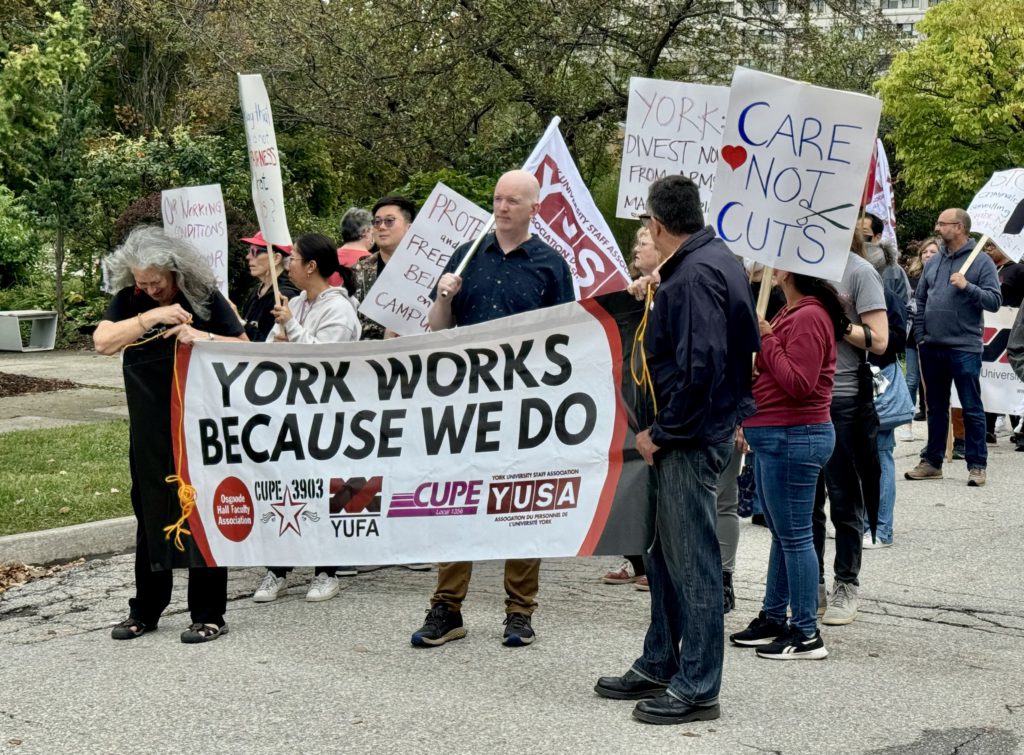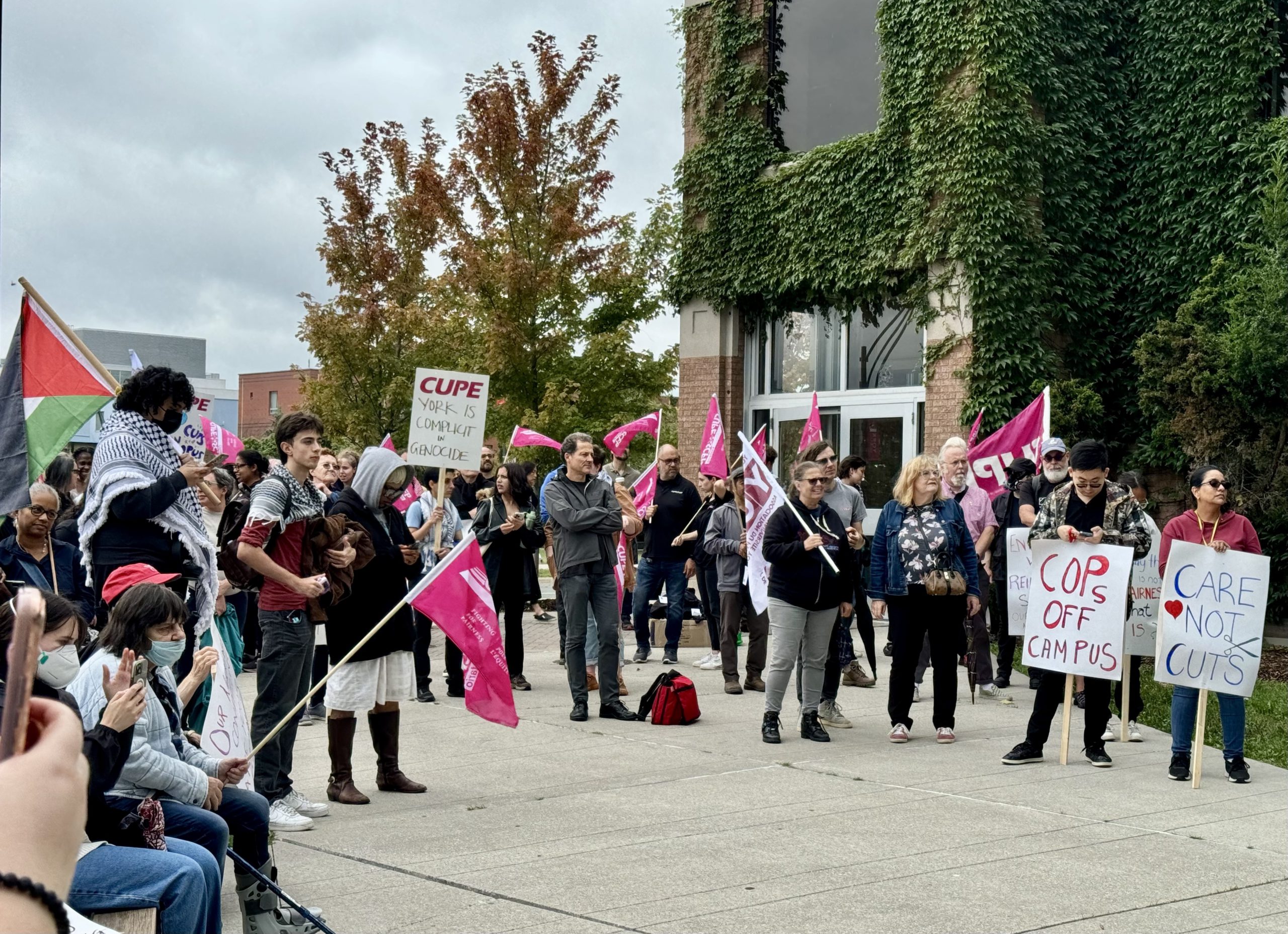On Sept. 25, a multi-union alliance between York University Staff Association (YUSA), CUPE 1356, CUPE 3903, York University Faculty Association (YUFA), and Osgoode Hall Faculty gathered below the Kaneff tower to express their frustrations with what they see as a long-term mismanagement of funds by the university’s administration.
The Rally to Reclaim the University is a response to several cost-cutting measures which will impact students and workers.
York’s budget plan spanning three years, from the 2023-2024 cycle to 2025-2026 proposes to reduce costs by almost $130 million to make the university more financially sustainable. According to the plan, these savings would make up for the “$675 million in lost revenue” due to a decline in enrolment, the extension of tuition freeze for Ontario students, and the long-term impacts of COVID-19.
To decide where to cut costs, York uses the SHARP budget model designed to “flow revenue to the units generating it.”
The Markham campus leads the list of York’s investment priorities despite the projected date on capital return set to 2038.
The university also places its hopes into the faculties, School of Continuing Studies, Advancement, and the Division of Students as main profit makers, while focusing the budget cuts on the “shared services units.” These units refer to departments that do not generate revenue directly but support university operations, including maintenance, custodial, security, and clerical staff.

Many of the workers feel that reducing the budget for shared services will significantly undermine the quality of the student experience. “Cuts have meant that there are no frontline staff available at the switchboard and key offices of student services,” says Hannah Johnston, a member of YUFA’s 2024 bargaining team.
Zoë Newman, chairperson for CUPE 3903, shares similar experiences. “We’ve seen courses being cut. We’ve seen course sizes ballooning. This has real material effects not only for workers, [but] also for students who are trying to get an education,” Newman says.
York’s Deputy Spokesperson, Yanni Dagonas, explains that these measures are necessary to improve the university’s financial situation.
“Clearly, if enrolment targets are missed or if our enrolment revenue has declined, the Shared Services must also do their part alongside and in discussion with the faculties,” he says.
However, the President of YUSA, Sonny Day, feels the York administration is hostile to unions. “Who makes up the board of governors?” asked Day, as he addressed the crowd at the rally. “By and large, it’s Bay Street bankers, it’s corporate C-suite executives. And they are taking that corporate mentality that exists everywhere else in this capitalist system and bringing it right here to York.
“They’re putting the squeeze on workers; they’re driving for more efficiency, which really means less worker rights and more managers,” said Day.
As reported in a previous article, discussing the reasons behind York’s repair backlog, from 2016 to 2023, the number of senior executives and managers at York increased by 42 per cent — an expansion disproportionate to the growth of the student population.
The article also shows that despite financial challenges, many of York’s senior administrators earn more than their equivalents at Toronto Metropolitan University or the University of Toronto, with some receiving almost double their salary.
The university recently implemented the Voluntary Exit Program (VEP) to save costs on workers. The program is a part of the York U Forward Action Plan and offers monetary compensation for YUSA and CUPE 1356 workers to quit the university. According to Day, over a hundred employees accepted the package, leaving many unions “incredibly short-staffed.”
“We can barely do our job,” says Colleen Ferreira, York parking officer and the recording secretary of CUPE 1356, sharing that her unit went down from 12 to 10 people.
“Now we’re left to do their job because the whole point of the Voluntary Exit Program was to get rid [of people] and save money. Well, now we’re going to be struggling to do our job,” she says.



While the guiding principles of the York U Forward Action Plan HR initiatives are “preserving operations central to the University’s core mission and future prospects” and “honoring collective agreements and equitable labour practices,” Day expresses concern for the wellbeing of workers, who must now juggle more with less support.
“People are experiencing stress and burnout and psychological issues because of the overwork here. And it’s only going to get worse.”
York’s track record shows a lack of common ground with its unions. The CUPE 3903 strike earlier this year cut into the academic timeline of every student, delaying dozens of graduations. Later in August, a possibility of a faculty strike loomed over fall classes after YUFA and the university failed to reach satisfactory terms for the new collective agreement.
Both CUPE 1356 and YUSA Unit 1 are currently bargaining to re-establish the terms of the collective agreement. However, workers feel that sitting across the table with the administration isn’t enough to send their message across. Instead, they choose to stand in front of the Kaneff tower, taking their grievances to the public forum.
Day acknowledges that the multi-union alliance at York is crucial to the workers’ success. “When you see workers standing together in solidarity, we hope that that sends a message to the administration,” he shares.
Anson Nater, a teaching assistant and PhD student, expresses that CUPE 3903 stands in solidarity with workers whose jobs are threatened by cost-cutting restructuring.
“I think a lot of people here are holding on to hope that the administration will do the right thing, bargain fairly, preserve these people’s jobs, and recognize the important services that they provide to students here on campus,” he says.
However, York workers won’t leave their opportunity to be heard up to chance. CUPE 3903 has also addressed the administration in an open letter that states: “Cost-cutting measures are harming the quality of York as an educational institution and undermining safe working conditions. They are also fundamentally unnecessary.”
Despite their ideological differences, the workers and the administration continue to search for solutions that secure the best conditions for the university’s students and workers. Yet, the rift they must bridge to meet at the bargaining table grows ever larger.





If you fail to prepare you are prepared to fail. Go on strike in 2000, 2008, 2015, 2018 and 2024 you’re guaranteed to miss enrolment targets. Who the hell wants to go to a school committed to disrupting students’ education?
Most of the people running this place have nothing more than high school education or have come from other businesses/agencies/jobs/etc because they have been kicked out due to some sort of felonious/questionable activity. Most of them know f*** all when it comes to managing especially in the education sector. They are capitalists looking for bigger better pay cheques and they turn universities/colleges into capitalist ventures. All they want is money. The degrees that you pay arms and legs for are worth diddly squat in the job market. You are just essentially paying for their fancy houses and cars
You should start researching the backgrounds of some of these idiots they hire. They like to move around often from job to job and there are reasons for it even whether it is public knowledge or not
Funny how Brad Parkes (Assistant Vice-President, Facilities Services at York University) jumped ship a year before Laurentian University declared insolvency (primarily due to financial mismanagement and heavy administrative/managerial bloat) and ended up in a grossly overpaying position at York receiving a whopping $249,762 salary in 2023 to basically do nothing. Funny how these people get around. York University is the new Laurentian University = gross financial mismanagement and administrative/managerial bloat. As the late Rob Ford touted as his campaign slogan it is time to “stop the gravy train”. If York University wants to “improve the university’s financial situation” they better implement an immediate long term hiring freeze on administration, management, and senior executive positions, cut these aforementioned position back by a minimum of 42 percent, and stop giving these people gross salary raises and yearly bonuses because yes they get yearly bonuses for doing f*** all
For Brad Parkes yearly salary before bonuses you can hire approximately 7 full-time custodial staff or approximately 6 full-time maintenance staff.
Hey York, it is time to stop the gravy train and cut your managerial/executive/administrative bloat. You keep touting how the front line workers, the ones who clean your buildings and fix your buildings, need to step up and tighten our belts and sacrifice our jobs for your the financial sustainability of the university, well how about you tighten your belts significantly and cut the excess gravy. You’re the ones that got us into this mess, so you should be the ones to make sacrifices and get us out of this mess. Financial mismanagement